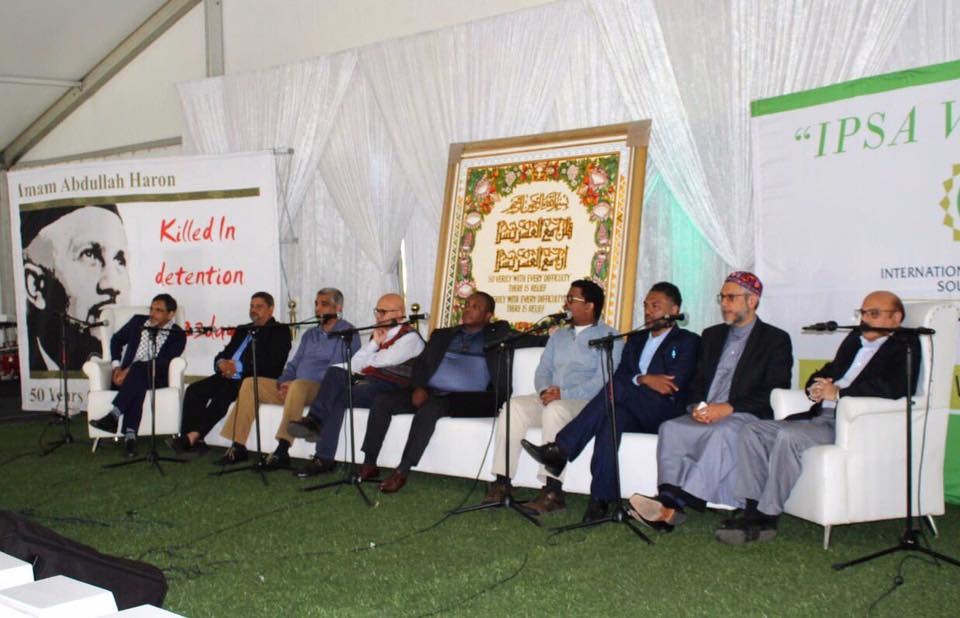By Anees Teladia
South Africa’s 25 years of hard-won freedom and democracy is a milestone, but for many, this freedom has been tainted. While South Africans celebrated Freedom Day on Saturday 27th of April, there was a conflicted mood among political activists at the IPSA Freedom Day Symposium held at the Spice Mecca Ramadaan For All Exhibition.
The symposium brought together several public figures and academics to voice their opinions on the significance of the day and the state of our socio-political climate. Among these speakers were Nkosinathi Biko, Lukhanyo Calata, Imtiaz Cajee, Prof Muhammed Haron, Prof Aslam Fataar, Judge Siraj Desai, Shaykh Ihsaan Taliep, Cassiem Khan and national government’s Economic Development Minister, Ebrahim Patel.
For many, Freedom Day is both a celebration of all that we have achieved as a country through our liberation and new government, but it is also a day of reflection and disappointment for many others.
“Not all of the liberties we fought for have been obtained…not all those that have been attained are enjoyed by the majority of South Africans,” said Biko, the son of legendary struggle icon Steve Biko, in his address to the symposium.
“We live in a country where 54% of people live beneath the bread line.”
“At best, our freedom has been partly achieved.”
Biko also commented on the lasting effects of the tragic and crippling legacy of Apartheid – a legacy which many no longer seem interested in because of the perception that it is in the past and that South Africans no longer suffer the effects.
“We must view 1994 as the beginning of the end of Apartheid, not as the end of Apartheid. There is a lot of work to do, which starts with unpacking our history and correcting the historical archives.”
Journalist and author Lukhanyo Calata said he had “mixed emotions” about marking Freedom Day. Lukhanyo is the son of activist Fort Calata, who was part of the famous Cradock Four. Calata and three others were rumoured to be on a secret police hit list for their active participation in the struggle against Apartheid in the Cradock area. In June 1985, the South African security police abducted all four activists, killed them and burnt their bodies.
“To me, this is the kind of day that my father wanted for us in the country. I’m happy because my father’s life was not in vain. We mark 25 years of a democratic and free South Africa, but it also marks 25 years of a democracy that has failed to give us the justice we required,” said Calata.
“I celebrate the day because we achieved freedom but I also despise this day because it is a reminder of the failures of this democracy.”
He reminded everyone that while it was a celebration of a day that the country earned, it was not earned without great sacrifice, bravery and bloodshed.
“We are here today to celebrate and say thank you to those people who were brave enough [to struggle] and whose blood was shed for us to have this freedom.”
“My father’s blood was shed for me to have this freedom.”
Vice Dean of the education faculty at Stellenbosch University, Professor Aslam Fataar gave a more Islamic and philosophical speech, but touched on many important issues.
He engaged on the issue of Zionism, Palestine, imperialist powers, state sovereignty in countries such as Venezuela and discrimination.
“The Shahid (martyr) would be wasted on those who support the Zionist state of Israel in their persecution of the Palestinians, on those who trample on the sovereignty of Venezuela, those who fail to be hospitable to the refugee, those who fail to challenge gender and all other forms of discrimination, and those who violate the dignity and human rights of the farmworker, the factory worker, and the township dweller,” said Fataar.
On the topic of state progress post-Apartheid, Judge Siraj Desai mentioned that while we have many remaining problems, we cannot neglect the fact that we have also made significant strides in the right direction. Judge Desai also suggested that as citizens we need to do more than simply complain.
“[Over] the last 25 years we’ve solved some of the many problems in this country, but we should not lose sight of the fact that the gains of 1994 have not been lost.”
“The problem in this country is an enormous one. But it is not sufficient simply to posit a problem. What we have to do is posit an alternative. We must begin to wake the tenets of a democratic society,” said Judge Desai.
VOC






 WhatsApp us
WhatsApp us 

